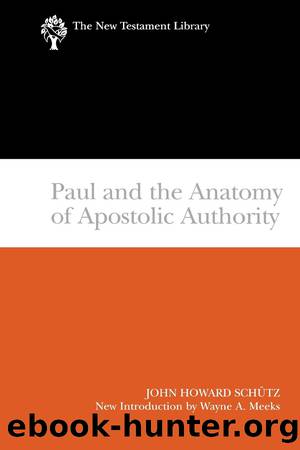Paul and the Anatomy of Apostolic Authority by John Howard Schütz

Author:John Howard Schütz
Language: eng
Format: epub
ISBN: 9781611644968
Publisher: Westminster John Knox Press
Published: 2014-08-15T00:00:00+00:00
GAL. 2: 11â21
We can only understand the situation and the appeal to authority implicit in Paulâs remarks in 2: 1â10 by taking into account the crucial scene in 2: 11â21 and its probable historical background. At an unspecified time after the Jerusalem conference Peter was in Antioch along with Paul and Barnabas, enjoying full fellowship with the gentile Christians. Specifically, there was but one table, which may mean that the fellowship of the eucharist was being celebrated as part of a larger meal.2 The common act of eating together denies any visible distinction between Jewish and gentile Christians, between those circumcised and those uncircumcised. When âsome men from Jamesâ come, however, Peter withdraws from this expression of common fellowship and âseparates himselfâ from the gentiles. Barnabas takes the same cue as do the ârest of the Jewsâ.
Paulâs displeasure is evident in vv. 14â21. Equally evident is the close connection of these verses to the larger body of the letter and especially to the christological argument in ch. 3. In 2: 11ff., Paul is moving from the Antioch scene to the purpose at hand in writing the letter. Nevertheless, vv. 14ff. also constitute a reprise of themes introduced through chs. 1 and 2. Paul will not set aside the grace of God (v. 21), the clear implication being that Peter does. The break between a former and present life, so sharply etched in 1: 5ff., provides much of the theological tenor of these verses. If one were to build up the very things he has destroyed, he would prove himself a sinner (v. 18). Through the law Paul has died to the law that he might live to God; he has been crucified with Christ (v. 19). It is no longer he who lives but Christ who lives in him (v. 20a).
All of this and more Paul educes in his reproach to Peter whom, with the others, he accuses of not being âon the right road toward the truth of the gospelâ.1 But why? If Peterâs actions are a violation of the Jerusalem agreement, the agreement is astounding. Did both Jerusalem and Paul fail to foresee at that time the implications of recognizing an independent missionary movement based in Antioch? If Jerusalem could foresee such problems, was it acting in deception at the time of the meeting? Why would Barnabas, the most visible member of the Antioch missionary movement, succumb so quickly to Jerusalemâs position if Jerusalem but reneged on an earlier agreement?2
Barnabasâ action makes it almost impossible to construe the Antioch affair as a simple act of bad faith on Jerusalemâs part. Certainly Barnabas does not regard it that way, and if Paul does, then we must allow for the possibility that Paulâs view of the meaning and implications of the Jerusalem agreement was not shared by Antioch. In point of fact it was not. Galatians 2: 11f. stands as the memorial not only to Paulâs break with Barnabas, a rupture construed by Luke (Acts 15: 26â41) as purely personal,3 but to his emergence as a fully independent missionary with no ties to Antioch.
Download
This site does not store any files on its server. We only index and link to content provided by other sites. Please contact the content providers to delete copyright contents if any and email us, we'll remove relevant links or contents immediately.
Phoenicians among Others: Why Migrants Mattered in the Ancient Mediterranean by Denise Demetriou(606)
american english file 1 student book 3rd edition by Unknown(605)
Verus Israel: Study of the Relations Between Christians and Jews in the Roman Empire, AD 135-425 by Marcel Simon(590)
Caesar Rules: The Emperor in the Changing Roman World (c. 50 BC â AD 565) by Olivier Hekster(571)
Basic japanese A grammar and workbook by Unknown(571)
Europe, Strategy and Armed Forces by Sven Biscop Jo Coelmont(520)
Give Me Liberty, Seventh Edition by Foner Eric & DuVal Kathleen & McGirr Lisa(497)
Banned in the U.S.A. : A Reference Guide to Book Censorship in Schools and Public Libraries by Herbert N. Foerstel(488)
The Roman World 44 BC-AD 180 by Martin Goodman(478)
Reading Colonial Japan by Mason Michele;Lee Helen;(467)
DS001-THE MAN OF BRONZE by J.R.A(462)
Introducing Christian Ethics by Samuel Wells and Ben Quash with Rebekah Eklund(455)
Imperial Rome AD 193 - 284 by Ando Clifford(454)
The Oxford History of World War II by Richard Overy(453)
The Dangerous Life and Ideas of Diogenes the Cynic by Jean-Manuel Roubineau(451)
Catiline by Henrik Ibsen--Delphi Classics (Illustrated) by Henrik Ibsen(426)
Language Hacking Mandarin by Benny Lewis & Dr. Licheng Gu(409)
Literary Mathematics by Michael Gavin;(407)
Brand by Henrik Ibsen--Delphi Classics (Illustrated) by Henrik Ibsen(389)
